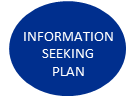Information seeking plan
The information seeking plan is available in various formats:Students taking the course LIBESIS Systematic information Seeking use the online form in Moodle. For other users:
Systematic information seeking is a part of your research process from beginning to end. An information seeking plan helps you to document and keep track of the different steps of your information seeking process from planning to conducting searches to saving references. Once you learn the basic steps of the process, you can follow the plan in any assignment or study that requires information seeking. Information resource means e.g. databases, search portalsInformation source means e.g books, articles |
 |
|---|
INFORMATION SEEKING PLANThe information seeking plan contains questions and tasks which guide you through the steps of information seeking and help you recognize central information resources in your academic field. The information seeking plan contains questions and tasks. Please answer briefly based on what you learn in the Library Tutorial. Follow the links in the plan to study the Library Tutorial. |
Name and e-mail address of each group member:
Academic discipline or field of study:
Objectives
Choose 3 objectives for the group! Choose the ones that you think are especially important for you to learn while you work on the plan.
1. I can tell the difference between everyday information and academic information.
2. I can identify key concepts related to my topic and turn them into search terms.
3. I am able to combine search terms into search statements.
4. I am familiar with the publication culture in my academic field.
5. I know how to search for scholarly articles.
6. I know which databases are central in my academic field.
7. I can evaluate and refine search results.
8. I understand the concept of reference management software (e.g. Zotero).
9. I understand why using references is important and I am familiar with academic ethics.
Feelings
What kind of feelings and/or thoughts does this assignment bring out?
PART A1. DEFINING THE TOPIC AND FINDING BACKGROUND INFORMATIONInformation resources for different needs Choose a scholarly topic of your interest
What databases do you use to find background information on your topic? Name the databases (at least 2).
What kind of information do you need to narrow down your topic? Write down any essential concepts and terms you find for later use.
What are the most interesting aspects of the topic? What do you wish to find out? Formulate your research question(s), for example one main question and two additional questions! Keep in mind the general form of research questions.
|
2. SEARCH TERMS AND SEARCH STATEMENTSSearch terms and search strategies Create a mind map! Use paper or an online tool, such as Mindmap Maker or Mindmup. The goal is to divide your topic into smaller pieces. Put your topic in the middle. Around the topic, write down each different aspect of your topic. List related concepts and synonyms for each aspect. 1. Start the mind map with the basic concepts. Use dictionaries, for example MOT. 2. Find subject terms and add them to your mind map. Where did you find the subject terms? Name the resources, for example YSO and a thesaurus from a central database of your field. Help: Resources by Subject -pages. Which tools/resources did you use?
Add your mind map here:
Combine your search terms into at least two different search statements. Use operators, truncation and phrase marks. Keep your research question(s) in mind and combine the central aspects of the topic into a search statement. |
3. RESEARCH METHODS AND DATAResearch methods and data
|
PART BName and e-mail address of each group member:
|
4. FINDING SOURCESPublication culture on different disciplines Which publication types are favored in your academic field? List 2–3 publication types starting with the most essential one (e.g. articles, books, conference papers).
Finding books What databases do you use to find sources? Name 1–3 central databases for each of the publication types, again starting with the most essential one. Check the Resources by Subject -pages.
Seek information in one of the databases for your most essential publication type. Use the search statements you created earlier. What database did you use? Which search statement worked best? Did you modify the search statements?
How useful is the database for you? Why?
Choosing scholarly and reliable sources Name 3–5 ways of evaluating sources: how can you identify scholarly and reliable sources?
|
5. REFINING SEARCH RESULTSUsing the same database, list strategies for refining your search results in case you get a) irrelevant results: b) too many results: c) too few results:
|
6. CITING AND MANAGING REFERENCESAcademic ethics and copyright For a scholarly article, what information do you need to give in the bibliography (=list of references)? The name of the author etc.
Give an example of an article in the bibliography – write out the reference as you would if you were creating a list of references.
How are you going to manage your references? Why?
|
|
Objectives
|
